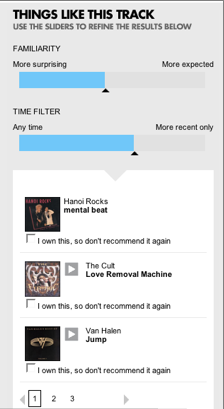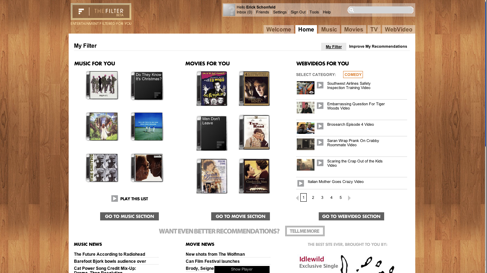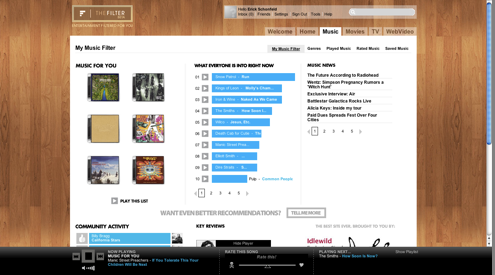 Peter Gabriel knows a thing or two about music, and he thinks he’s come up with a better way for you to find new music that will rock your world. The latest digital music company he is backing is called The Filter. It is essentially a meta-recommendation engine for music, movies, and Web video. Right now, it works best for music. The site was announced today and we have beta invites. There are only 100 of them. So sign up here. You probably have about 30 seconds before they are all gone.
Peter Gabriel knows a thing or two about music, and he thinks he’s come up with a better way for you to find new music that will rock your world. The latest digital music company he is backing is called The Filter. It is essentially a meta-recommendation engine for music, movies, and Web video. Right now, it works best for music. The site was announced today and we have beta invites. There are only 100 of them. So sign up here. You probably have about 30 seconds before they are all gone.
The site (which is a little bit buggy right now) is designed as an entertainment start page, with music, movie, and Web video recommendations that change daily. There are also RSS feeds that link to music and movie reviews. Explains David Maher Roberts, CEO of Exabre (the British company that runs the Filter):
The idea of the Website is the world of entertainment filtered for you. We go out and find lots of information, and filter that according to your taste. The more we know about you, the more we can give you a daily dose of entertainment content.
For now, though, the company is focusing mostly on getting the music recommendations right. Click on the music tab and you are presented with a list of songs selected for especially for you, as well as a list of songs that “everyone is into right now.” You can play each list, but only 30-second samples from each (a major drawback to the site that could be rectified through a deal with We7, an ad-supported, full-track online music service that Gabriel is also an investor in).
The Filter combines together a number of filtering approaches based on purchase, listening, browsing, and rating histories. It tries to collect as much information about musical tastes as it can, both yours and other people’s—overall music purchases, your iTunes history, how you rate songs and artists on the site, and the listening habits and ratings of your friends. In a sense it combines Amazon’s collaborative filtering with Last.fm’s behavioral filtering. Says Roberts:
Amazon’s recommendations are based on purchase data. Last.fm’s are based on consumption data. We are based on both.
 The Filter gathers your listening history through an iTunes plug-in that you need to download (also called The Filter) that scans your music library and keeps track of your listening habits, similar to iLike’s iTunes plug-in or Last.FM’s Scrobbler. Then the Filter adds to that by comparing it to overall digital music purchase data. It gets this from OD2, another Gabriel-backed startup that was bought by Loudeye (later bought by Nokia) and powers the digital music stores for Nokia and MSN Music. (When Gabriel sold OD2, he invested in Exabre, which has raised $8.5 million in venture capital). All in all, the company’s database is filled with information about 4.5 million songs, 330,000 movies, and 50 million music transactions and playlists.
The Filter gathers your listening history through an iTunes plug-in that you need to download (also called The Filter) that scans your music library and keeps track of your listening habits, similar to iLike’s iTunes plug-in or Last.FM’s Scrobbler. Then the Filter adds to that by comparing it to overall digital music purchase data. It gets this from OD2, another Gabriel-backed startup that was bought by Loudeye (later bought by Nokia) and powers the digital music stores for Nokia and MSN Music. (When Gabriel sold OD2, he invested in Exabre, which has raised $8.5 million in venture capital). All in all, the company’s database is filled with information about 4.5 million songs, 330,000 movies, and 50 million music transactions and playlists.
The Filter’s data, however, is skewed 80 percent towards European markets, so it ends up recommending songs that are more popular across the pond (they still love The Smiths over there). You can fine-tune the recommendation engine by rating individual songs or artists, or tweaking the engine with sliders that bring up “more expected” or “more surprising” matches. You can also filter by new or old songs. The recommendations seem a little hit or miss. (The Smith’s “How Soon Is Now?” and Joy Division’s “Love Will Tear Us Apart.” Okay. But Van Halen’s “Jump”?). These should get better over time.
Every filtering approach has its issues. Collaborative filtering has a cold start problem. Until someone build up a purchase history, you don’t really know much about her tastes. Filtering based on the music people own or listen to runs into what Roberts calls the “Beatles Problem”:
There are several problems with the Beatles. For one thing, there is no purchase information. But the real problem is that everybody owns or has the Beatles in their collection. The algorithm thinks it goes with everything. If you leave an algorithm to its own devices, it keeps on recommending the same thing.
To get around these issues, the Filter’s algorithm recognizes super-popular songs and handicaps them with anegative bias so that they don’t dominate the recommendations. It also takes into account inertia. If you haven’t listened to the Rolling Stones in a while, their weighting starts to decay. The system learns about you, but also forgets about you. It gives purchase information the most weight, followed by consumption data gathered from the iTunes plug-in, followed by your ratings and other data.
The Filter has a long way to go to be competitive with Last.fm, iLike, or many other online music services. But its technology-agnostic approach and strong music ties could help it distinguish itself. Definitely what needs strengthening is the social aspect of the service. You can add friends, but they all need to be members right now. This summer, members will be able to take The Filter with them to Netvibes or iGoogle as widgets that show a recommended playlist. A Facebook app is also in the works that will let you mix your musical taste with a friend’s to come up with a musical taste mashup.



